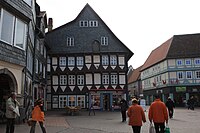Wolfenbüttel
This article may be expanded with text translated from the corresponding article in German. (December 2009) Click [show] for important translation instructions.
|
Wolfenbüttel | ||
|---|---|---|
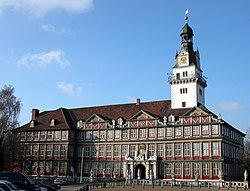 Wolfenbüttel Castle | ||
| ||
Location of Wolfenbüttel | ||
 Wolfenbüttel Show map of Germany  Wolfenbüttel Show map of Lower Saxony | ||
| Coordinates: 52°09′44″N 10°32′13″E / 52.16222°N 10.53694°E / 52.16222; 10.53694Coordinates: 52°09′44″N 10°32′13″E / 52.16222°N 10.53694°E / 52.16222; 10.53694 | ||
| Country | Germany | |
| State | Lower Saxony | |
| District | Wolfenbüttel | |
| Government | ||
| • Mayor | Thomas Pink (CDU) | |
| Area | ||
| • Total | 78.46 km2 (30.29 sq mi) | |
| Elevation | 77 m (253 ft) | |
| Population (2017-12-31)[1] | ||
| • Total | 52,357 | |
| • Density | 670/km2 (1,700/sq mi) | |
| Time zone | CET/CEST (UTC+1/+2) | |
| Postal codes | 38300, 38302, 38304 | |
| Dialling codes | 05331 | |
| Vehicle registration | WF | |
| Website | www.wolfenbuettel.de | |
Wolfenbüttel (German pronunciation: [ˌvɔlfn̩ˈbʏtl̩]) is a town in Lower Saxony, Germany, the administrative capital of Wolfenbüttel District. It is best known as the location of the internationally renowned Herzog August Library and for having the largest concentration of timber-framed buildings in Germany. It is an episcopal see of the Evangelical Lutheran Church in Brunswick. It is also home to the Jägermeister distillery and houses a campus of the Ostfalia University of Applied Sciences.[2]
Contents
1 Geography
2 Mayor
3 History
4 Main sights
5 Culture
6 Twin cities
7 People
8 Notable people
9 Bibliography
10 See also
11 References
12 External links
Geography
The town centre is located at an elevation of 77 ft (23 m) on the Oker river near the confluence with its Altenau tributary, about 13 km (8.1 mi) south of Brunswick and 60 km (37 mi) southeast of the state capital Hanover. Wolfenbüttel is situated about half-way between the Harz mountain range in the south and the Lüneburg Heath in the north. The Elm-Lappwald Nature Park and the Asse hill range stretch east and southeast of the town.
With a population of about 52,000 people, Wolfenbüttel is part of the Hannover–Braunschweig–Göttingen–Wolfsburg Metropolitan Region. It is the southernmost of the 172 towns in Northern Germany whose names end in büttel, meaning "residence" or "settlement."[3]
Mayor
The mayor of the town Wolfenbüttel is since 2006 Thomas Pink (CDU). He was reelected in 2014 with 67.7% of the vote.
History
A first settlement, probably restricted to a tiny islet in the Oker river, was founded in the 10th century. It was mentioned in 1118 as Wulferisbuttle, when the Saxon count Widekind of Wolfenbüttel had a water castle erected on the important trade route from Brunswick to Halberstadt and Leipzig. Destroyed by Henry the Lion in 1191, and again by his great-grandson Duke Albert I of Brunswick-Lüneburg in 1255, the fortress was acquired and rebuilt by the Welf duke Henry I of Brunswick from 1283 onwards.
By 1432, the town had become a permanent residence of the Brunswick Princes of Wolfenbüttel. Devastated in the 1542 Schmalkaldic War, it was largely rebuilt in a Renaissance style under Duke Julius of Brunswick-Lüneburg, including several gracht waterways laid out by Hans Vredeman de Vries. The duke vested the citizens with market rights in 1570 and founded the Ducal Library (Herzogliche Bibliothek, the later Bibliotheca Augusta) two years later.
During the Thirty Years' War, Danish troops under King Christian IV occupied the fortified town in 1626. Upon the nearby Battle of Lutter, they were besieged by the Imperial forces of General Gottfried Heinrich Graf zu Pappenheim. Re-conquered in 1627, the Wolfenbüttel fortress remained under the command of Gottfried Huyn von Geleen. In June 1641 the Battle of Wolfenbüttel was fought here, when the Swedish forces under Wrangel and the Count of Königsmark defeated the Austrians under Archduke Leopold of Habsburg, however, they failed to occupy the town.
Over two centuries, especially under Duke Julius' successors Henry Julius and Augustus the Younger, Wolfenbüttel grew to be a centre of the arts and science: Already in 1604, the composer Michael Praetorius (1571–1621) served as Kapellmeister of the Brunswick dukes. From 1682, the composer Johann Rosenmüller (1619–1684), who had to flee Germany due to allegations of homosexuality, spent his last years in Wolfenbüttel. Gottfried Leibniz (1646–1716) and Gotthold Ephraim Lessing (1729–1781) directed the Ducal Library, and established one of the first lending libraries in Enlightenment Europe.[4] However, the ducal court eventually returned to Brunswick in 1753 and Wolfenbüttel subsequently lost in importance.
During World War II, the city prison became a major execution site of prisoners of the Gestapo. Most of those executed were members of various Resistance groups.[5] One such victim was a Dom Lambert, a monk of Ligugé Abbey in France, who was beheaded there on 3 December 1943.[6]
Main sights
- The baroque castle Schloss Wolfenbüttel. In 1866, the castle became the Anna-Vorwerk-School for girls. Today part of the building is used as a high school; it also houses a great example of Baroque state apartments, which are open to the public as a museum.
Herzog-August-Bibliothek (HAB), the ducal library, hosts one of the largest and best-known collections of ancient books in the world. It is especially rich in bibles, incunabula, and books of the Reformation period, with some 10,000 manuscripts. It was founded in 1572 and rehoused in an interpretation of the Pantheon in 1723, built facing the castle; the present library building was constructed in 1886. Leibniz and Lessing worked in this library as librarianS. The Codex Carolinus in the library is one of the few remaining texts in Gothic. The library also houses the bible of Henry the Lion, a book preserved in near mint condition from the year 1170.[7]
Klein-Venedig. A pittoresque waterside building ensemble (Gracht) along the River Oker built in the 18th century.- The churches Marienkirche (Hauptkiche Beatae Mariae Virginis), built during the 17th century, and St.-Trinitatiskirche (Trinity Church), built during the early 18th century.
The town is also the location of the former Northampton Barracks, which housed units of the British Army of the Rhine until 1993 (postcode: BFPO 101).
Today, Wolfenbüttel is smaller than the neighbouring cities of Braunschweig (Brunswick), Salzgitter, and Wolfsburg, but, because it was largely undamaged by the war, its downtown is rich in half-timber buildings, many dating several centuries back, and it still retains its historical character. Wolfenbüttel is located on the German Timber-Frame Road.
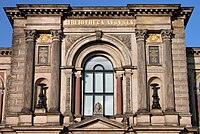
The portal above the entrance to the HAB

The residence of Gotthold Lessing when he was librarian at the HAB

Wolfenbüttel's Zeughaus (former armory) now houses part of the HAB's Exhibitions
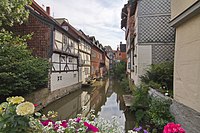
Klein-Venedig

Beatae Mariae Virginis

Trinity Church
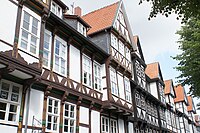
Fachwerk Häuser, a German style of Timber framing in Wolfenbüttel

Culture

The herb liqueur Jägermeister is distilled in Wolfenbüttel
Wolfenbüttel is home of several departments of the Ostfalia University of Applied Sciences[8] and the Lessing-Akademie, an organisation for the study of Lessing's works. It is also home to the Niedersächsisches Staatsarchiv, the state archives of Lower Saxony, as well as the renowned Biblioteca Augusta.
The herb liqueur Jägermeister's headquarters of Mast-Jägermeister are still located in Wolfenbüttel, and some of its distillation sites.
Wolfenbüttel hosted the three-day International German Bus Pulling Championships in May 2009, where five-person teams pull a 16-ton bus 30 meters.[9][10]
Every year starting in late November, Wolfenbüttel stages a Christmas market with food and drinks. Locals often come and enjoy the pre-Christmas Atmosphere.
Twin cities
 Sèvres, France
Sèvres, France
 Kenosha, Wisconsin, United States
Kenosha, Wisconsin, United States
 Satu Mare, Romania
Satu Mare, Romania
 Kamienna Góra, Poland
Kamienna Góra, Poland
 Rhondda Cynon Taf, Wales
Rhondda Cynon Taf, Wales
A bridge in Wolfenbüttel is named after each of these cities.
In Kenosha, there is a park located on the coast of Lake Michigan named after Wolfenbüttel.

Wolfenbüttel Park In Kenosha Wisconsin USA (sister city)
People
Augustus William, Duke of Brunswick-Lüneburg(1662-1731)
Duchess Anna Amalia of Brunswick-Wolfenbüttel, a German princess and composer (1739-1807)- Antonio Wolfenbuttel - Brazilian TV Personality known under the alias of Joåo Paolo Vitor Diego
Notable people

Elisabeth Christine around 1739

Georg Scholz Self-portrait (undated)
- 1489: Henry V, Duke of Brunswick-Lüneburg, Prince of Brunswick-Wolfenbüttel, died 1568
- 1528: Julius, Duke of Brunswick-Lüneburg, Prince of Brunswick-Wolfenbüttel, died 1589
- 1696: August Querfurt, genre, horse, and hunting artist, died 1761
- 1715: Elisabeth Christine of Brunswick-Wolfenbüttel-Bevern, wife of the Frederick II Queen in Prussia, died 1797
- 1724: Johann Julius Walbaum, physician, natural scientist, died 1799
- 1739: Duchess Anna Amalia of Brunswick-Wolfenbüttel, Duchess and composer
- 1746: Elisabeth Christine of Brunswick-Wolfenbüttel, Crown Princess of Prussia, daughter of Duke Charles I (Braunschweig)
- 1774: Friederike von Reden, philanthropist and salon-holder, Mother of the Hirschberg Valley, died 1854
- 1810: August Ludwig von Rochau, publicist and politician, died 1873
- 1813: Theodor Engelbrecht, physician, professor and pomologist, died 1892
- 1816: Theodore Eisfeld, composer, chief conductor of the New York Philharmonic, died 1882
- 1851: Victor Ehrenberg, legal scientist, died 1929
- 1857: Richard Ehrenberg, National Economist, died 1921
- 1890: Georg Scholz, painter of new objectivity, died 1945
- 1964: Hans-Jörg Meyer, sports shooter
- 1987: Arnd Peiffer, biathlete
Bibliography
- Bepler, Jochen: Kleine Wolfenbütteler Stadtgeschichte. Pustet, Regensburg 2011. .mw-parser-output cite.citation{font-style:inherit}.mw-parser-output q{quotes:"""""""'""'"}.mw-parser-output code.cs1-code{color:inherit;background:inherit;border:inherit;padding:inherit}.mw-parser-output .cs1-lock-free a{background:url("//upload.wikimedia.org/wikipedia/commons/thumb/6/65/Lock-green.svg/9px-Lock-green.svg.png")no-repeat;background-position:right .1em center}.mw-parser-output .cs1-lock-limited a,.mw-parser-output .cs1-lock-registration a{background:url("//upload.wikimedia.org/wikipedia/commons/thumb/d/d6/Lock-gray-alt-2.svg/9px-Lock-gray-alt-2.svg.png")no-repeat;background-position:right .1em center}.mw-parser-output .cs1-lock-subscription a{background:url("//upload.wikimedia.org/wikipedia/commons/thumb/a/aa/Lock-red-alt-2.svg/9px-Lock-red-alt-2.svg.png")no-repeat;background-position:right .1em center}.mw-parser-output .cs1-subscription,.mw-parser-output .cs1-registration{color:#555}.mw-parser-output .cs1-subscription span,.mw-parser-output .cs1-registration span{border-bottom:1px dotted;cursor:help}.mw-parser-output .cs1-hidden-error{display:none;font-size:100%}.mw-parser-output .cs1-visible-error{font-size:100%}.mw-parser-output .cs1-subscription,.mw-parser-output .cs1-registration,.mw-parser-output .cs1-format{font-size:95%}.mw-parser-output .cs1-kern-left,.mw-parser-output .cs1-kern-wl-left{padding-left:0.2em}.mw-parser-output .cs1-kern-right,.mw-parser-output .cs1-kern-wl-right{padding-right:0.2em}
ISBN 978-3-7917-2328-0. - Fimpel, Martin: Erst Großbaustelle und dann eine andere Stadt. Der lange Abschied von der Festung Wolfenbüttel, in: Braunschweigisches Jahrbuch für Landesgeschichte Bd. 94, 2013, S. 161–192.
- Grote, Hans Henning: Schloss Wolfenbüttel, Residenz der Herzöge zu Braunschweig und Lüneburg. Appelhans Verlag, Braunschweig 2005
- Schwarz, Ulrich (Hrsg.): Auf dem Weg zur herzoglichen Residenz. Wolfenbüttel im Mittelalter. Appelhans Verlag, Braunschweig 2003
- Stadt Wolfenbüttel (Hrsg.): Wolfenbüttel unter dem Hakenkreuz. Fünf Vorträge von Reinhard Försterling,[Dietrich Kuessner, Hans-Ulrich Ludewig, Wilfried Knauer, Dieter Lent; Heckner-Print-Service-GmbH, Wolfenbüttel 2000 GBV
Braunschweiger Zeitung „Spezial“
Residenzstadt Wolfenbüttel – Ein Streifzug durch die Geschichte; Nr. 9 (2004)
Junges Leben in alten Häusern – 25 Jahre Stadtsanierung in Wolfenbüttel; Nr. 9 (2005)
See also
- Metropolitan region Hannover-Braunschweig-Göttingen-Wolfsburg
References
^ Landesamt für Statistik Niedersachsen, Tabelle 12411: Fortschreibung des Bevölkerungsstandes, Stand 31. Dezember 2017
^ Ostfalia School of Applied Sciences
^ The Latin adjective deriving from the town is Guelpherbytanus; e.g. Bibliotheca Guelpherbytana.
^ Horn Melton, James Van, The Rise of the Public in Enlightenment Europe (Cambridge University Press, 2001), p106
^ "Braunschweig - Brunswick". Slave Labor in Nazi, Germany, Camps.
^ "Presentation: Historique". Abbaye Saint-Martin de Ligugé (in French).
^ Herzog August Bibliothek Wolfenbüttel. "www.hab.de". www.hab.de. Retrieved 2013-01-01.
^ ostfalia.de
^ page 22 March 2009 Forbes
^ "Bus Pulling Germany website". Buspulling.de. Retrieved 2013-01-01.
.mw-parser-output .refbegin{font-size:90%;margin-bottom:0.5em}.mw-parser-output .refbegin-hanging-indents>ul{list-style-type:none;margin-left:0}.mw-parser-output .refbegin-hanging-indents>ul>li,.mw-parser-output .refbegin-hanging-indents>dl>dd{margin-left:0;padding-left:3.2em;text-indent:-3.2em;list-style:none}.mw-parser-output .refbegin-100{font-size:100%}
(in German) Grunow, Heinz and Wessel, Wolfgang. Wolfenbüttel: ein Bildband. Grenzland-Verlag Rock & Co., Wolfenbüttel. 1977
External links
| Wikimedia Commons has media related to Wolfenbüttel. |
Official website (in German)
(in German)









